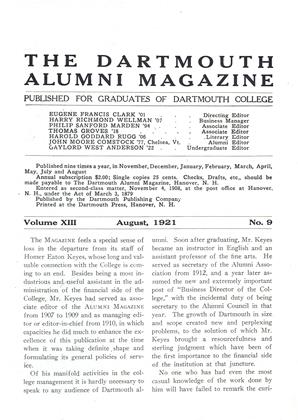The following interesting communication from Ed '09 to a classmate reveals another phase of the activity of Dartmouth men in far corners of the world. Meleney is with the Peking Union Medical College at Peking, China.
China is so big and so foreign to any of our former ideas of living, and our school's problem is such an immense one, that a mere note can hardly do justice to either.
This institution, started about seventeen years ago by several mission societies, was taken over by the China Medical Board of the Rockefeller Foundation, for the purpose of establishing a medical center in China which would train Chinese men and women on the same plane of efficiency as is required in the best medical schools in America. Its graduates are expected to devote themselves largely to medical teaching, research and public health work, besides the general practice of medicine, and they will be a nucleus from which it is hoped that an efficient medical profession will some day be developed in China In older to provide an efficient medical school, a plant has been built, which is now nearing completion, consisting of a teaching hospital and modern laboratories with equipment equal to any such institution in America. Externally the buildings are finished in typical Chinese architecture, with green tile roofs, eaves curving upward, gaudily painted wood-work and marble courtyards copied from Chinese temples and palaces. Next to the places in the Forbidden City, the group of twelve buildings is the most conspicuous in the city. The formal opening will take place next September, when noted medical men from all over the world are expected to visit us.
The curriculum consists, of three years of premedical work, corresponding to three years of college in America, and five years of medical work, the last of which is hospital internship. The most advanced class is now finishing its second year of medical work, and consists of seven men of varying ability, averaging about the same as classes do in a good medical school in America. The teaching is done in English, which in some ways is a handicap to the students, but which in the end is a great advantage because of the medical literature it opens up to them. The lower classes are larger and contain women as well as men.
The faculty is made up of Americans, Canadians, and English, and has been recruited both from men already in medical missionary work in the Far East, and from especially trained men in their home countries. Harvard Medical School has the largest representation here, but Johns Hopkins, Columbia, Illinois, Chicago and many other schools are also represented. Beside the teaching of medicine, one function of the institution is to solve some of the medical problems of China, and several of the departments are already busy on this work. Most of the faculty live in two residence compounds in which modern American homes have been built, so that the new environment is not as strange as though we had to live in paper-windowed stove-heated Chinese houses.
Dartmouth men are not numerous in Peking, though there are many in China. My brother Frank, '10, is in the Department of Surgery here and lives next door to us. Dr. David E. Ford '04 will join the staff soon in the Department of Obstetrics. Hon. Charles D. Tenney '76, has until recently been counsellor of legation of the American Legation in Peking, but retired last year and has returned home. One of the first people I saw when I landed in Shanghai last December was Bill Patterson of our class. His address is American P. O. Box 803, Shanghai. He was looking well and prosperous. H. W. Robinson '10 is with the American Board Mission at Pao Ting Fu, about 100 miles south of Peking, and is going to share his cottage with us in the Western Hills this summer.
I wish I could write a long letter about this wonderful city, about the amazing Chinese people and something of the close-up view of the great famine. Perhaps there will be another chance for that later.
I cannot close without mentioning the "Bulletins" which some kind'soul has sent out so frequently from Hanover this year. They have kept us in close touch with the everyday life of the college. I hope they will continue indefinitely. They mean a great deal to us out here.
With best wishes, Yours in '09, May 15, 1921.
 View Full Issue
View Full Issue
More From This Issue
-
 Article
ArticleCOMMENCEMENT 1921
August 1921 -
 Article
ArticleTHE UNPROVABILITY OF MAN
August 1921 By ERNEST MARTIN HOPKINS -
 Article
ArticleThe MAGAZINE feels a special sense
August 1921 -
 Class Notes
Class NotesCLASS OF 1876
August 1921 By HENRY H. PIPER -
 Article
ArticleEXTRACT FROM RECORDS OF TRUSTEES' MEETING, JUNE 20, 1921
August 1921 -
 Class Notes
Class NotesCLASS OF 1911
August 1921 By N. G. BURLEIGH








